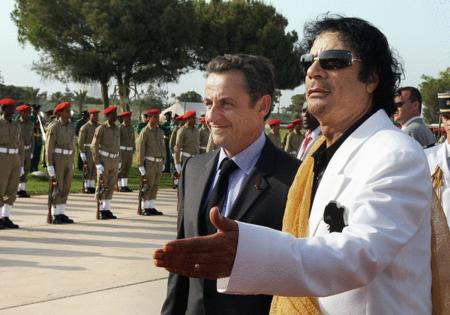Obama and Hillary can’t dodge links to a French president’s recent prison sentence
PARIS — “We came. We saw. He died,” cackled then-Secretary of State Hillary Clinton during a CBS News interview back in October 2011, moments after she learned that then-Libyan leader Muammar Gaddafi had been regime changed. Ah, the joy of foreign policy condensed into a morbid sound bite. Equal parts gloating, history and “whoopsies, we just changed a government.” But did she know, in that gleeful instant, just how much corruption was swirling under the surface of that US-backed regime change?
Because we sure do now.
Former French President Nicolas Sarkozy was just sentenced to five years in the slammer last week by a Parisian criminal court. What wasn’t headline news (though it should have been in neon lights) was the drama's cameo by President Barack Obama and then-Secretary Hillary Clinton.
Two of Sarko’s pals, Brice Hortefeux and Claude Guéant — both of whom would go on to run French law enforcement as interior ministers after practicing mob-style criminality — were convicted of ferrying suitcases involving up to €50 million ($59 million) in Libyan cash at Sarkozy’s direction starting in 2005, ostensibly to fund his victorious 2007 presidential campaign. The court found enough proof to make everyone squirm in their leather chairs — but, alas, not enough to trace the money to the actual campaign coffers. Cash, after all, has a talent for vanishing into the air. Especially when it’s up to no good. So, Sarkozy got nailed for criminal conspiracy rather than the more glamorous charges of outright corruption, illegal campaign financing or theft of Libyan funds.
But the global political events surrounding this drama warrant revisiting because they’re reframed through a very different lens as a result of this conviction.
After winning the election, Sarkozy wasted no time playing PR wizard for Gaddafi. He invited the Libyan leader to the Élysée Palace, spinning him as a brilliant African ally in the war on terror. Fast- forward to 2011: Hillary Clinton is in Paris, hobnobbing with members of the future Libyan government, while Gaddafi was not just still alive, but also still in power. Not for long, though.
A few days later, the United Nations Security Council passed a resolution to enforce a no-fly zone over Libya. A slippery slope that would soon topple Gaddafi — and teach Russia never again to take Western no-fly zones at face value.
Who pushed hardest for the bombastic entrance into Libya? Not the Americans, for a change, but France. The justification? Humanitarian intervention. Even the left bought it. David Cameron, then British prime minister and erstwhile neocon, joined the chorus, perhaps dazzled by the combo of moral righteousness and lucrative defense contracts. Reuters reported that more than half of the £260 million ($348 million) in British tax cash spent on the military operation ended up back in British munitions manufacturers’ pockets.
Another convenient case of moral imperative having a totally chance meeting with a lucrative business opportunity.
"Tomorrow in London, the international community will come together to support a new beginning for Libya. A new beginning in which the people of Libya are free from violence and oppression, free to choose their own future,” declared Sarkozy and Cameron in a joint statement.
Ah yes, doesn't every "new beginning" begin with some positive affirmations followed by bombs?
The UN vote was sold as “protecting civilians from the violence unleashed by Gaddafi’s war machine.” The result? Libya was shattered, migrants flooded Europe and neither has yet recovered.
As the French-led NATO bombings commenced, Gaddafi’s son, Saif, accused Sarkozy of using the invasion as a convenient cover-up. “We funded it and we have all the details and are ready to reveal everything,” he claimed, referencing Sarkozy’s 2007 campaign. Gaddafi himself said in a French TV interview, “Sarkozy is mentally deficient. … It’s thanks to me that he became president. … We gave him the funds that allowed him to win.
In retrospect, it was also strange that Sarkozy freaked out at the mere idea of a U.S.-led NATO taking over the invasion, as reported by The Guardian.
Like, why are you so into all this, bro? Cue the side-eye.
Meanwhile, Obama bragged about Washington’s rare minimalist approach: no boots on the ground. “I said that America’s role would be limited; that we would not put ground troops into Libya … and that we would transfer responsibility to our allies and partners,” he said in March 2011.
Instead, French intelligence (DGSE) officers were deployed to “hunt for Gaddafi” alongside the spontaneously formed Libyan opposition, as the NATO-linked Atlantic Council think tank reported.
While the French were super into all this, NATO’s secretary genera l explicitly stated that Gaddafi himself “was not a target of NATO’s operation.”
But someone — not naming any names here — ultimately made sure that Gaddafi ended up being dragged through the streets and shot by “Libyan rebels,” though the trigger-puller remains shrouded in mystery.
Surely it’s just a coincidence that those same Libyan rebels were meeting with Sarko’s longtime pal and public intellectual, Bernard-Henri Lévy, about whom the New Yorker has explicitly asked whether he “took NATO to war.”
In the end, it all wrapped up nicely for Sarkozy, but what about Clinton, Obama and their interventionist foreign affairs cheer squad — Susan Rice, Samantha Power — who happily ate the “human rights” sales pitch that Sarkozy served up as if it were gourmet foie gras?
If there’s a lesson here, it’s that regime change often comes with secret ingredients like personal gain and murky interests. Sometimes even the most prominent players don’t fully grasp what they’re swallowing. And in this case, one can’t help but wonder if the French “chef” orchestrating it all was smirking, knowing they’d keenly scarf it down, oblivious to the fact that he’d already spit in the sauce.
































Comments